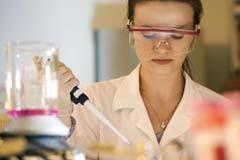The content of the Science Diploma, which will be available at three levels, is beginning to take shape.

The Science Diploma is about work-related learning - places, employment and contexts in which people use science in their work. A hands-on approach to the acquisition of scientific skills and knowledge is expected to play a key role. Students will be expected to experience real scientific workplace practice (how people use science in their work) across the spectrum of scientific endeavour. A further feature of the Diploma is that it will recognise that while interdisciplinary approaches to science are increasingly common and should be included, teams often consist of specialists.
The effective use of science also requires students to develop knowledge and understanding, as well as an understanding of the process of science - in GCSEs and GCE A-levels as 'how science works'. In the Diploma the management of, for example, the use of resources within constraints of materials, time and budgets will also be included. Students need to be able to deal with unfamiliar situations, which requires them to be able to transfer their skills, knowledge and understanding learned in one context to different contexts. This will teach them to adapt readily and be neither intimidated nor unable to respond effectively to new situations.
Levels and structure
The Science Diploma will be available at three levels:
- foundation (level 1): roughly GCSEs D-G;
- higher (level 2): roughly seven GCSEs A*-C;
- advanced (level 3): roughly 3½ GCE A-levels.
At each level, the Diploma will consist of:
-
principal learning: presented as topics, which will be core to all learning programmes, and will require the same time as: 2-2½ GCSEs at the foundation level; 4- 4½ GCSEs at higher level; and 1½ GCE A-levels at the advanced level;
-
generic learning: will be made up of:
(i) functional skills - English, mathematics and ICT;
(ii) personal learning and thinking skills (independent enquiry, creative thinking, reflective learning, team working, self-management, effective participation);
(iii) a project (an extended project for the Advanced diploma);
(iv) work experience (minimum of 10 days); -
additional and specialist learning: will enable learners to add further breadth or depth. At advanced level, this has the 'size' of a GCE A-level, but it need not be a GCE A-level.
A student's programme may include other qualifications in addition to those that comprise the Diploma.
Themes and topics
Principal learning in the three Diploma levels consists of topics. During development, and perhaps beyond, themes have been used to arrive at possible topics and to monitor the progression of content through principal learning from foundation to advanced levels.
At the time of writing the Science Diploma Development Partnership (SDDP) is exploring and consulting on a model with three themes - living; material; and physical. Some proposed topics align closely with a single theme. Others straddle more than one theme. (This could be pictured as a Venn diagram with three overlapping circles, each circle representing a theme. This approach reinforces the idea of the interdisciplinary nature of science, yet recognises that specialists remain important. Opportunities for specialisation exist within choice of project, work experience and additional and specialist learning.
Next stages
The SDDP will produce a Line of Learning Statement (LOLS) by March 2009. This says what should be included in the curriculum and specifications. It also seeks to ensure that teaching and learning are appropriate and fit for purpose. Consultation on the final draft LOLS will be from 9 January to 9 February 2009 (online consultation and a number of face-to-face events). After this, the Qualifications and Curriculum Authority (QCA) will produce criteria for specifications, which will be developed by the awarding bodies. (The Royal Society of Chemistry has been and will continue to be consulted.)
Ken Gadd is science adviser to the chair of the SDDP steering group, Professor Hugh Lawlor. He also leads the Qualification Development Group.






No comments yet